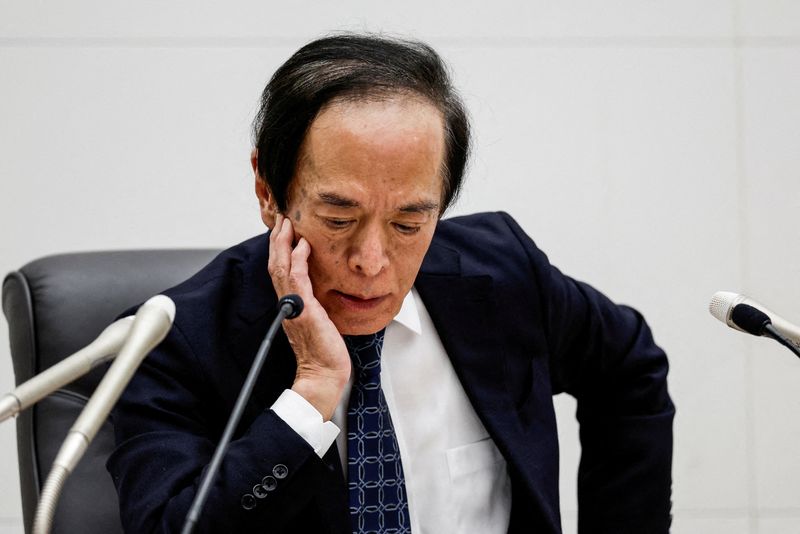By Leika Kihara
TOKYO (Reuters) – The Bank of Japan is staying guarded on the timing of the next rate hike with December hardly a done deal given soft consumption, its governor’s cautious decision-making style and anxiety over U.S. economic policy in a second Trump presidency.
BOJ Governor Kazuo Ueda signalled that December will be a live meeting in an interview with the Nikkei newspaper last week, when he said another rate hike was approaching.
But he also warned of U.S. economic uncertainties and gave no clear sign the BOJ would indeed hike this month, causing market expectations of a move to fluctuate between December and January.
Having steered Japan through a decade of ultra-easy monetary policy, the BOJ is wary of moving too fast in removing accommodative conditions, especially after a July rate hike caught markets by surprise and triggered a sharp bout of volatility in currencies, bonds and stocks.
Heightened geopolitical tensions and uncertainty over U.S. President-elect Donald Trump’s policies are also encouraging global policymakers, including in Japan, to approach their tasks with circumspection.
After rising to around 60% following last week’s release of solid inflation data, market bets of a December hike slid below 40% on Wednesday as fresh doubts emerged from media reports suggesting the BOJ will take a more cautious stance.
Adding to the market confusion, dovish BOJ board member Toyoaki Nakamura didn’t rule out a December hike, saying the timing would be data dependent.
While the BOJ has its eyes set on hiking rates by around March, it likely wants to leave itself a free hand on the exact timing, say three sources familiar with its thinking.
“What’s clear is that December will be live, as with any other meeting in coming months,” said one of the sources. “But from there, it’s really a judgement call by the board,” the source said, a view echoed by two more sources.
People who know Ueda, an economics professor-turned governor, also point to his decision-making style, which is to wait until the last minute assessing data in reaching a conclusion.
“He works with an academic mindset, which is to look thoroughly at each data before deciding,” one of them said on condition of anonymity as he was not authorised to speak publicly. “It’s unlikely he would drop signals about something he hasn’t decided yet.”
After the Dec. 18-19 meeting, the BOJ holds a rate review on Jan. 23-24 and March 18-19.
There is growing conviction within the BOJ that wages will keep rising and prod firms to hike prices – meeting a key prerequisite for another rate hike, the sources said.
Regular pay has been rising at an annual pace of around 2.5-3%. Japan’s largest labour union group has said it will seek wage hikes of at least 5% in 2025, near this year’s hefty gains.
Inflation remains above the BOJ’s 2% target for well over two years with rising labour costs pushing up services prices.
But other data paint a less rosy picture. Household spending fell in October for the third straight month as rising living costs pinched consumers.
Factory output remains flat and exports to the United States, Japan’s largest export market, slumped in October on weak auto shipments.
While firms ramped up capital expenditure in July-September, recurring profits fell 3.3% from year-before levels on intensifying competition overseas, data showed.
OPTIMAL TIMING
The BOJ has already whittled down stimulus twice this year, ending negative interest rates in March and raising short-term borrowing costs to 0.25% in July.
Ueda has repeatedly said the BOJ will keep hiking rates if the economy and prices move in line with its forecast, leading many analysts to project another hike by March.
With the BOJ making clear that it will be taking a data-dependent approach in setting policy, each indicator leading up to the December meeting will likely draw strong market attention.
Revised third-quarter gross domestic product data is due on Monday, followed by the BOJ’s quarterly “tankan” business survey on Dec. 13.
Threats of higher tariffs by Trump have stoked fresh uncertainty about the global outlook – a factor Ueda said warranted scrutiny in his interview with Nikkei.
With the yen off a three-decade trough near 162 hit in July and inflation showing little sign of overshooting, the BOJ is under less pressure to hike immediately, some analysts say.
“I don’t see the BOJ as in a huge rush, as long as it can hike by March,” said veteran BOJ watcher Mari Iwashita, who is chief market economist at Daiwa Securities.
“For the BOJ, it’s just a question of choosing the most optimal timing among the three meetings.”

